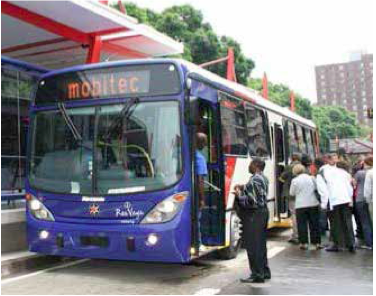Metros make public transport a pleasure to use
Metros make public transport a pleasure to use sadminTransport Month
Metropolitan municipalities across the country are changing the face of public transport and improving the commuter experience.
 Various metros are at different stages of building the bus rapid transport (BRT) system which provides sleek buses with dedicated lanes to transport commuters safely, cheaply and swiftly to destinations that cut across established routes.
Various metros are at different stages of building the bus rapid transport (BRT) system which provides sleek buses with dedicated lanes to transport commuters safely, cheaply and swiftly to destinations that cut across established routes.
With buy-in from the taxi industry and improved road network, the BRT system is slowly turning South Africa’s public transport system into one of the best in the world.
This much was confirmed by delegates to the Annual Metropolis Meeting held in Sandton recently who praised Johannesburg's “Rea Vaya” bus system as a pioneering transport system.
City of Johannesburg, Gauteng
The City of Johannesburg was the first to implement the Rea Vaya Bus Rapid Transport (BRT) system in 2009.
The BRT covers over 25 km between Soweto and the city centre, transporting an average of 42 000 passengers a day.
A new route recently launched runs from Parktown through Auckland Park, Westbury, Industria, Bosmont and Noordgesig to Soweto. The City of Johannesburg director of marketing and communications, Benny Makgoga, says that since its launch four years ago the system has created 21 911 construction jobs (55 days of employment). There are 48 stations across the Greater Johannesburg area, with 143 buses in Phase 1A. Phase 1B will see 13 new stations come into operation soon with a fleet of 134 buses.
The city is now set to construct another route from the inner city to Alexandra and Sandton. The new route will be completed in 2016.
City of Cape Town, Western Cape
The City of Cape Town has upgraded its infrastructure and is almost ready to welcome commuters to its integrated rapid transit (IRT) system. Director for IRT projects and implementation, Dave Hugo, says construction of Phase 1A will be finished in November.
The Cape Town system will stretch for 17. 7 km of median bus lanes, 2 km of bi-directional lanes, and 20.5 km of mixed traffic. There will be 51 km of bi-directional feeder routes. The system will have 17 stations and 137 stops. So far, the city has spent R 5.2 billion on the IRT.
City of Tshwane, Gauteng
Construction of the City of Tshwane’s integrated bus rapid transit system (BRT) called “A Re Yeng” (Let’s go) started in August 2012. The system will set back the city R3.2 billion for phase 1 until 2017. The project has created over 700 jobs thus far.
Project manager of the Tshwane BRT system Lungile Madlala says it is intended to transform the public transport system by using modern technology.
“The BRT System will be characterised by various elements such as segregated median bus lanes, BRT stations, state-of-the-art buses, smartcard technology which will provide the system with the tools to attain the efficiency, safety and universal accessibility which are but some of the goals and objectives the BRT System.”
Ethekwini Municipality, KwaZulu-Natal
The eThekwini Municipality is implementing an integrated rapid public transport network (IRPTN) comprising 250 km of public transport corridors of which some 60 km are rail-based. Of the remaining 190 km of road-based trunk corridors, 60 km are to be implemented early in 2016.
The full IRPTN network will be within 800m (10 to 15 minutes’ walk) for more than 85 % of the municipality’s population.
Ekurhuleni Metropolitan Municipality, Gauteng
The head of the department for transport planning and provision in Ekurhuleni, Yolisa Mashilwane, says they will soon have their own BRT system.
“We intend to start construction mid-2014. We are busy with the designs and [will] launch the operations in 2016.”
The system is expected to transport 33 000 commuters daily between the central business district of Boksburg and Vosloorus and between Tembisa Hospital and OR Tambo International Airport.
The city has received R240 million from National Treasury's public transport infrastructure grant to start planning for its BRT.